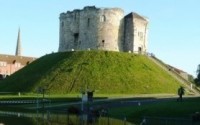The Norman Conquest in York: a Reassessment
- Date
- 26 May 2015
- Start time
- 7:30 PM
- Venue
- Tempest Anderson Hall
- Speaker
- Sarah Rees Jones

The Norman Conquest in York: a Reassessment
Sarah Rees Jones, Director of the Institute for Public Understanding of the Past, University of York
In 1068 William the Conqueror finally turned his attention to the north of England, determined to subdue and secure it for his newly conquered kingdom. At the centre of his strategy was the City of York. Under his leadership, and that of his immediate successors, York was transformed into a royal capital in the north. This lecture will focus on the impact of that transformation on the medieval city, arguing that many of the essential features of the city in the middle ages, and even beyond, were established as a consequence of the Conquest.
Member’s report
The years following the Conquest were turbulent ones for York, as William subdued and secured the North for his new kingdom. We know rather little of York in the early Norman period; and yet this was a formative time in which the structure and organisation of the later, medieval, city emerged. Sarah Rees Jones treated us to a virtuoso demonstration of how much can be gleaned from the painstaking analysis of mundane records of property ownership and land tenure.
The incoming Norman lords dominated York, with Anglo-Scandinavian landholders surviving, for a while, largely to the southeast, beyond the Foss. This was a pattern similar to that established in Nottingham, which came to be seen as distinct French and English boroughs. Within the French part of York, William reshaped the City along lines that persist to the present day. One example is the area known in the 12th and 13th centuries as Arkilltofts, possibly named after a pre-Conquest landholder. After the Conquest this became the site of the Kings Larder a supply base for the occupying Normans subsequently evolving into a civic market place, known later as the Thursday market and, currently, as St Sampsons Square.
Sarah shed much light on a dark age in Yorks history, a key period in the evolution of our city.
Peter Hogarth